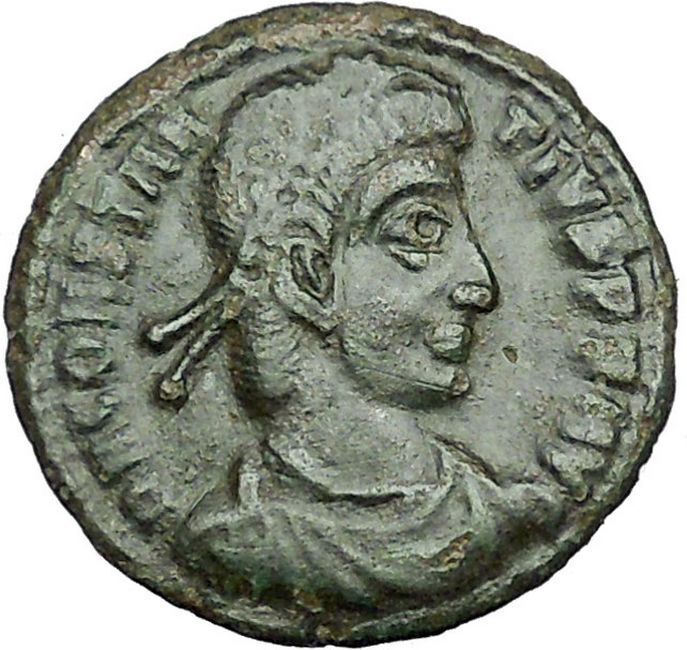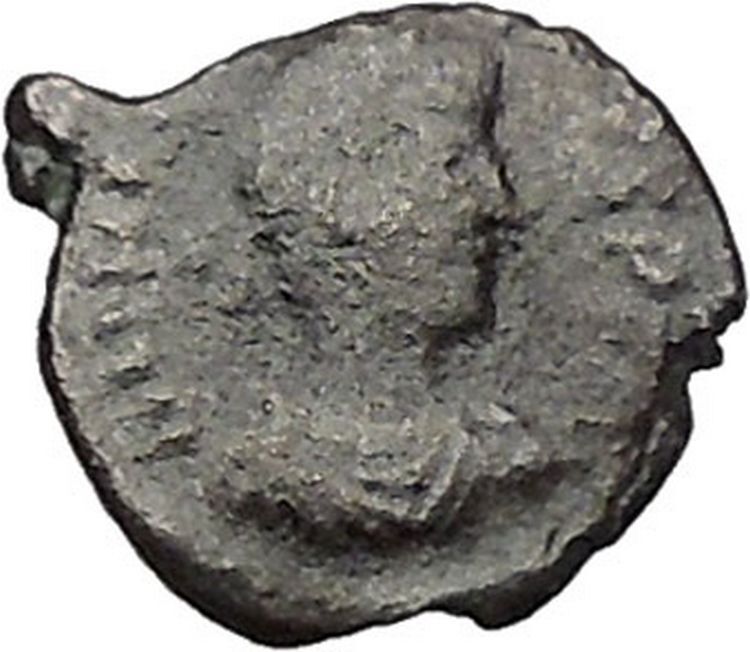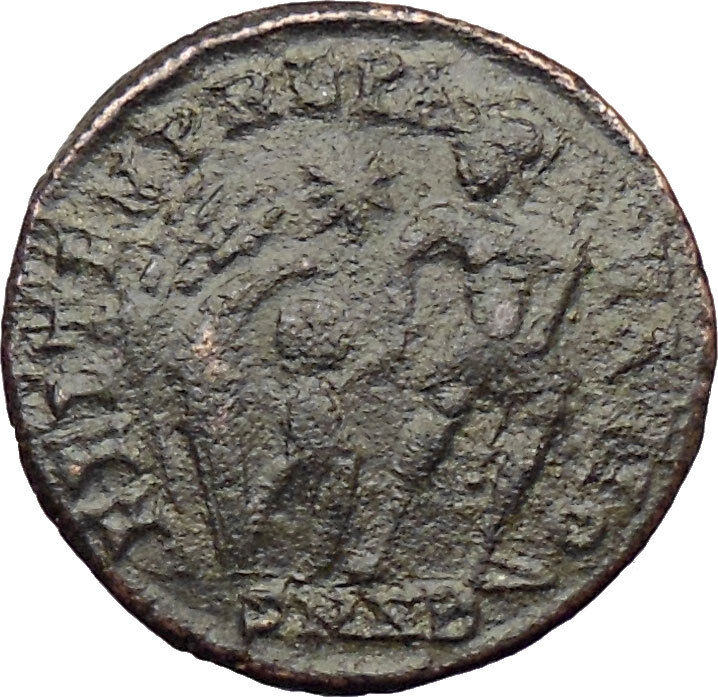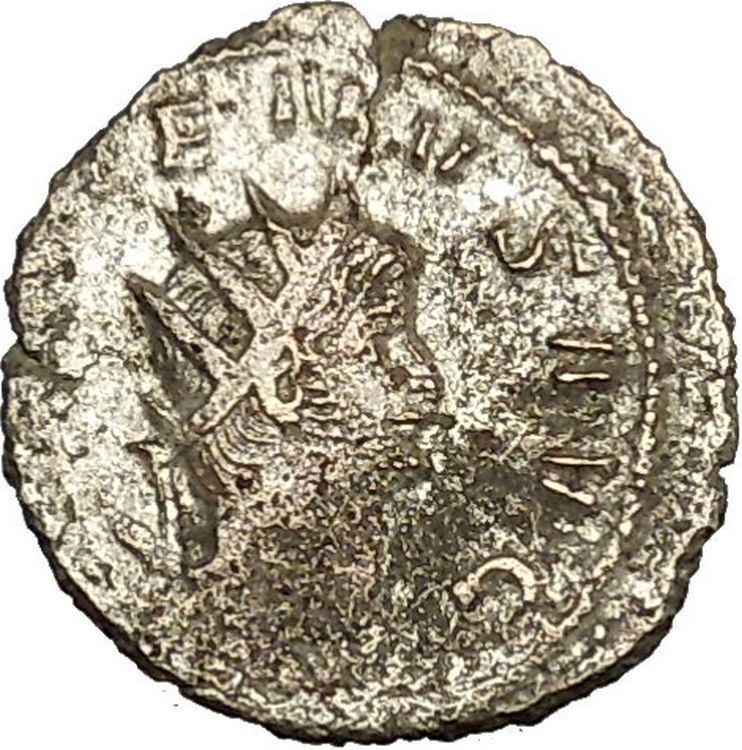|
Faustina II – Roman Empress & Wife of Emperor Marcus Aurelius – 161-175 A.D.
Bronze As 22mm (10.9 grams) ome mint. Struck under Marcus Aurelius, circa 170-175/6 A.D.
Reference: RIC III 1687 (Aurelius); MIR 18, 35-7c; Sear 5306 Cohen 276
FAVSTINA AVGVSTA, draped bust right.
VENVS FELIX S-C, Venus seated left, holding Victory and scepter.
You are bidding on the exact item pictured, provided with a Certificate of Authenticity and Lifetime Guarantee of Authenticity.
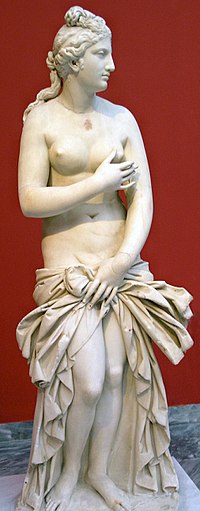 Venus was a Roman goddess principally associated with love, beauty and fertility, who played a key role in many Roman religious festivals and myths. From the third century BC, the increasing Hellenization of Roman upper classes identified her as the equivalent of the Greek goddess Aphrodite. Venus was a Roman goddess principally associated with love, beauty and fertility, who played a key role in many Roman religious festivals and myths. From the third century BC, the increasing Hellenization of Roman upper classes identified her as the equivalent of the Greek goddess Aphrodite.
Her cult began in Ardea and Lavinium, Latium. On August 15, 293 BC, her oldest known temple was dedicated, and August 18 became a festival called the Vinalia Rustica. After Rome’s defeat at the Battle of Lake Trasimene in the opening episodes of the Second Punic War, the Sibylline oracle recommended the importation of the Sicillian Venus of Eryx; a temple to her was dedicated on the Capitoline Hill in 217 BC: a second temple to her was dedicated in 181 BC.
Venus seems to have played a part in household or private religion of some Romans. Julius Caesar claimed her as an ancestor (Venus Genetrix); possibly a long-standing family tradition, certainly one adopted as such by his heir Augustus. Venus statuettes have been found in quite ordinary household shrines (lararia). In fiction, Petronius places one among the Lares of the freedman Trimalchio’s household shrine.
 Annia Galeria Faustina Minor (Minor Latin for the younger), Faustina Minor or Faustina the Younger (February 16 between 125 and 130-175) was a daughter of Roman Emperor Antoninus Pius and Roman Empress Faustina the Elder. She was a Roman Empress and wife to her maternal cousin Roman Emperor Marcus Aurelius. Though Roman sources give a generally negative view of her character, she was held in high esteem by soldiers and her own husband and was given divine honours after her death. Annia Galeria Faustina Minor (Minor Latin for the younger), Faustina Minor or Faustina the Younger (February 16 between 125 and 130-175) was a daughter of Roman Emperor Antoninus Pius and Roman Empress Faustina the Elder. She was a Roman Empress and wife to her maternal cousin Roman Emperor Marcus Aurelius. Though Roman sources give a generally negative view of her character, she was held in high esteem by soldiers and her own husband and was given divine honours after her death.
Faustina, named after her mother, was her parents’ fourth and youngest child and their second daughter; she was also their only child to survive to adulthood. She was born and raised in Rome.
Her great uncle, the Emperor Hadrian, had arranged with her father for Faustina to marry Lucius Verus. On February 25, 138, she and Verus were betrothed. Verus’ father was Hadrian’s first adopted son and his intended heir. However when Verus’ father died, Hadrian chose Faustina’s father to be his second adopted son, and eventually, he became Hadrian’s successor. Faustina’s father ended the engagement between his daughter and Verus and arranged for Faustina’s betrothal to her maternal cousin, Marcus Aurelius; Aurelius was also adopted by her father. On May 13, 145, Faustina and Marcus Aurelius were married. When her father died on March 7, 161, her husband and Lucius Verus succeeded to her father’s throne and became co-rulers. Faustina was given the title of Augusta and became Empress.
Unfortunately, not much has survived from the Roman sources regarding Faustina’s life, but what is available does not give a good report. Cassius Dio and the Augustan History accuse Faustina of ordering deaths by poison and execution; she has also been accused of instigating the revolt of Avidius Cassius against her husband. The Augustan History mentions adultery with sailors, gladiators, and men of rank. However, Faustina and Aurelius seem to have been very close and mutually devoted. Her husband trusted her and defended her vigorously against detractors.
Faustina accompanied her husband on various military campaigns and enjoyed the love and reverence of Roman soldiers. Aurelius gave her the title of Mater Castrorum or Mother of the Camp. Between 170-174, she was in the north, and in 175, she accompanied Aurelius to the east. However, these experiences took their toll on Faustina, who died in the winter of 175, after an accident, at the military camp in Halala (a city in the Taurus Mountains in Cappadocia).
Aurelius grieved much for his wife and buried her in the Mausoleum of Hadrian in Rome. She was deified: her statue was placed in the Temple of Venus in Rome and a temple was dedicated to her in her honor. Halala’s name was changed to Faustinopolis and Aurelius opened charity schools for orphan girls called Puellae Faustinianae or ‘Girls of Faustina’.[1] The Baths of Faustina in Miletus are named after her.
In their thirty years of marriage, Faustina bore Marcus Aurelius thirteen children:
-
Annia Aurelia Galeria Faustina (147-after 165)
-
Gemellus Lucillae (died around 150), twin brother of Lucilla
-
Annia Aurelia Galeria Lucilla (148/50-182), twin sister of Gemellus, married her father’s co-ruler Lucius Verus
-
Titus Aelius Antoninus (born after 150, died before 7 March 161)
-
Titus Aelius Aurelius (born after 150, died before 7 March 161)
-
Hadrianus (152-157)
-
Domitia Faustina (born after 150, died before 7 March 161)
-
Fadilla (159-after 211)
-
Annia Cornificia Faustina Minor (160-after 211)
-
Titus Aurelius Fulvus Antoninus (161-165), twin brother of Commodus
- Commodus (161-192), twin brother of Titus Aurelius Fulvus Antoninus, later emperor
- Marcus Annius Verus Caesar (162-169)
- Vibia Aurelia Sabina (170-died before 217)
|





 Venus was a Roman goddess principally associated with love, beauty and fertility, who played a key role in many Roman religious festivals and myths. From the third century BC, the increasing Hellenization of Roman upper classes identified her as the equivalent of the Greek goddess Aphrodite.
Venus was a Roman goddess principally associated with love, beauty and fertility, who played a key role in many Roman religious festivals and myths. From the third century BC, the increasing Hellenization of Roman upper classes identified her as the equivalent of the Greek goddess Aphrodite. Annia Galeria Faustina Minor (Minor Latin for the younger), Faustina Minor or Faustina the Younger (February 16 between 125 and 130-175) was a daughter of Roman Emperor Antoninus Pius and Roman Empress Faustina the Elder. She was a Roman Empress and wife to her maternal cousin Roman Emperor Marcus Aurelius. Though Roman sources give a generally negative view of her character, she was held in high esteem by soldiers and her own husband and was given divine honours after her death.
Annia Galeria Faustina Minor (Minor Latin for the younger), Faustina Minor or Faustina the Younger (February 16 between 125 and 130-175) was a daughter of Roman Emperor Antoninus Pius and Roman Empress Faustina the Elder. She was a Roman Empress and wife to her maternal cousin Roman Emperor Marcus Aurelius. Though Roman sources give a generally negative view of her character, she was held in high esteem by soldiers and her own husband and was given divine honours after her death.

